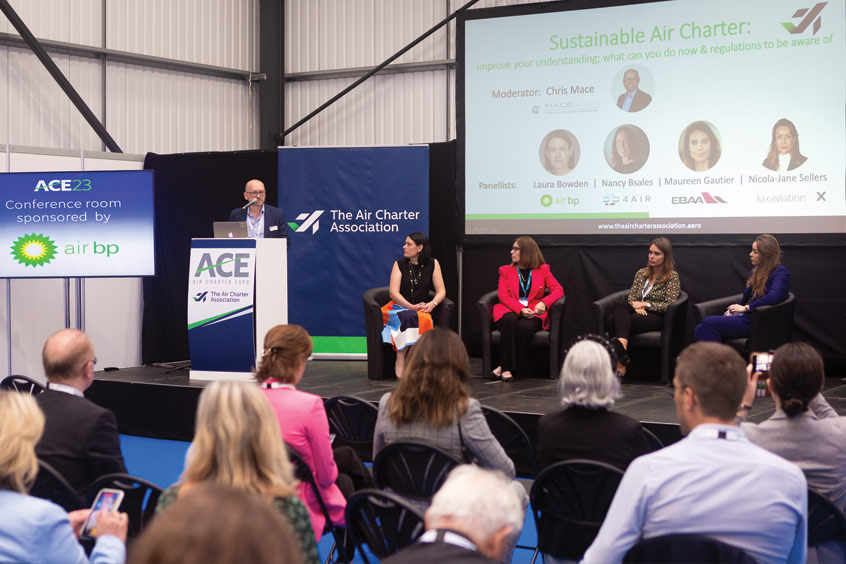Why visit ACE ’25?

Air Charter Expo 2023 (ACE'23), organised by The Air Charter Association (The ACA) in partnership with Business Air News and hosted by London Biggin Hill airport, provided an opportunity to showcase The ACA and the wider industry's work in sustainability.
The one day UK conference, held on 12 September, 2023 included two panel sessions which focused on sustainability and net zero targets, highlighting the air charter industry's engagement with sustainability challenges.
The first sustainability panel of the day was titled 'Sustainable Air Charter: improve your understanding. What can you do now and what regulations to be aware of', moderated by Chris Mace, The ACA board member and sustainability and innovation group chair, as well as CEO of MaceAero. In addition, the panel featured prominent guest speakers Laura Bowden from Air bp, Nancy Bsales of 4Air, Maureen Gautier from the EBAA and Nicola-Jane Sellers of Luxaviation Group.
The panel addressed a range of topics, from industry targets on sustainability, the pathways by which the industry can achieve these targets, the effectiveness of sustainability measures and how to ensure compliance across the air charter industry. The current main industry target is the 2050 net zero goal. Maureen Gautier of the EBAA outlined four core pathways by which the industry can achieve its objectives towards net zero: sustainable aviation fuel (SAF), market-based measures such as carbon offsetting, innovation (eg hydrogen power and projects such as eVTOL aircraft) and operational efficiency.
The panel advised that SAF is widely considered one of the most effective tools available to air charter operators in achieving sustainability objectives and while there is currently limited availability, Bowden stated that global production is being consistently increased and the industry can expect a far more reliable supply chain for SAF in the future. She described a range of methods for producing SAF, however it is essentially aviation fuel consisting of up to 50 per cent sustainable feedstocks, creating a potential carbon reduction of up to 80 per cent. There is also ongoing testing towards achieving a fuel blend of 100 per cent SAF, which highlights the positive direction the industry is pushing. Furthermore, companies such as Air bp procure independently certified SAF to ensure that the offsetting capacity is verifiable and transparent. Nancy Bsales of 4Air highlighted the fact that there are currently 45 locations globally carrying SAF, and where operators are unable to directly access SAF, they can use a 'Book & Claim' scheme to purchase and support SAF like a renewable energy credit. To date, 4Air has documented and traced over 20 million litres of SAF for business aviation alone.
One of the main tools available today is carbon offsetting, which Bsales described as a bridge to the future, in the sense that it is an immediate mitigation, until there is a higher SAF availability in the supply chain. While there has been some criticism of the effectiveness of carbon offset projects, Bsales assures that those used by 4Air are highly credible and are overseen by environmental auditors, who ensure that every unit of carbon offset is verified and serialised.
Nicola-Jane Sellers of Luxaviation Group shone a light on three core considerations that can influence operators and determine their stance on sustainability: corporate culture, strategy and regulatory compliance. Education was a theme which she underpinned as a driver of behavioural change and contributor to how a company approaches sustainability. Strategy is about the capability to incorporate sustainable methodologies into a business model (eg carbon offsetting). Regulatory compliance is something that will grow over time as legislation develops from a voluntary to a mandatory model of adherence. Ultimately, increasing environmental cognition to influence positive behavioural change is a complementary method for a just and equitable transition according. Sellers says: “Nature can guide us, or policy will force us.” Maureen Gautier of the EBAA believes the air charter industry is largely on the right track as 'more and more operators are investing in sustainability, particularly in SAF'.
The ACA has partnered with 4Air to provide members with an exclusive opportunity to address their sustainability initiatives. Whether operating a fleet, broker-chartered aircraft or support aircraft operations, The ACA/4Air sustainability partnership programme helps guide members through their journey to a sustainable tomorrow.